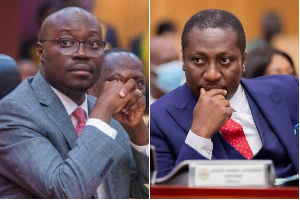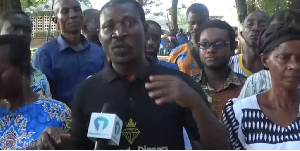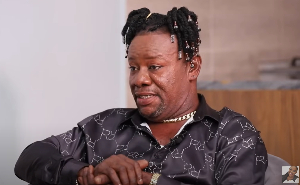By Richmond Keelson
Since the Progressive People’s Party (PPP) sprung up on the political scene, the question that has been on many lips, naturally, has been whether there is any difference between the PPP and other political parties, such as the National Reform Party (NRP), the United Ghana Movement (UGM) and the Democratic Freedom Party (DFP).
Until few weeks ago, Dr. Papa Kwesi Nduom was a leading member of the of the Convention People’s Party (CPP.) It is only weeks since he left the CPP to form and lead the PPP, but some analysts are already making allusions to his future by pointing to the vivid history of breakaway factions – or at least their leading personalities – who not invariably, after many years, re-join their parent groups.
It would be recalled that the National Reform Party (NRP) broke away from the National Democratic Congress (NDC) in 1998, but its members have retraced their steps back to their root and its leading members, such as its presidential candidate for the 2000 Elections, Augustus Goosie Tanoh, are now an integral part of the Professor Mills’ administration. Dr. Charles Wereko-Brobbey and his United Ghana Movement (UGM) also went back to the NPP when the party won the 2000 elections.
Also, the Democratic Freedom Party (DFP,) was created in 2006 out of a group angry over what happened at an NDC Congress at Koforidua. The DFP, led by its chief patron, Dr. Obed Yao Asamoah, moved back to the NDC last year after NDC members handed the Rawlingses probably the most humiliating political defeat of their lives; Mrs. Rawlings lost the NDC 2012 presidential ticket by 3%-96% to President John Evans Atta Mills.
Looking at such a history, the obvious and logical conclusion most an analyst might draw is that Dr. Nduom’s PPP is likely to tread the same path sooner or later. Indeed, most analysts who have voiced an opinion on this issue believe history is likely to replay itself – same circumstances, same decision, new party, beating a retreat. But I wish to draw the attention of such analysts to certain key issues that we believe worked against the independent survival of those breakaway parties.
It is important to note that the Progressive People’s Party rejects the “breakaway” label. Although about 70% of CPP constituency and regional executives have resigned to join the PPP, the new party expanded its constituency and regional executive numbers from the usual 9-13 to 20 people per constituency and region. Within a two week period this January, 20- member executives in the 230 constituencies and ten regions were sworn into office by the PPP
demonstrating its broad appeal beyond the CPP.
Dr. Nduom and the other founding members who were with the CPP had no intention whatsoever to leave the CPP, except for the burning desire of some elements in that party to force them out because they did not understand particularly Dr Nduom’s way of politics.
Obviously Dr. Nduom left the CPP in part due to the fact that he could no longer come to terms with the docile attitude of the CPP leadership towards the building and re-branding of the CPP for Election 2012. The CPP, through its snail-paced organization, has shown it is not prepared for the race to the Office of the President, and so any individual who shares a contrary view ought to seek a more vigorous institution that is prepared to put in place structures that will afford him or her the potential of wrestling power from the NDC and NPP.
The PPP does not believe in the usual ideological dogmas that many leaders of political parties, including those of the CPP, have entangled themselves with. The PPP is a pragmatic institution that dwells more on the exigencies of the time that require that the individual Ghanaian is a key factor in its operations. In effect the Ghanaian should be at the centre of development and that every effort should be made to build the capability and capacity of the Ghanaian to compete both on local and international levels.
The PPP, according to Dr. Nduom, is a credible alternative with a different agenda and seeks to provide the platform for all like-minded progressive forces to come together to compete against the NDC and NPP in this year’s elections. So unlike the DFP, NRP and the UGM, the PPP has set out clearly that it has a different agenda away from that of the CPP.
Perhaps that explains why many progressive forces, including majority of members of the CPP in particular, have resigned to join the PPP. Currently, the party also has in its fold others from the NDC, NPP, DFP, GCPP and many others who really want to see something positive in politics.
Perhaps the biggest attraction that makes Dr. Nduom different from the others is the man’s personality as an individual. The political clout of Dr. Nduom obviously towers above many politicians. What he has lacked has been a united political organization that shares his practical beliefs and supports him fully. This is what the new PPP will do.
Dr. Nduom was once an elected Assembly member for the Akotobinsin Electoral Area at Elmina in the Komenda-Edina-Eguafo-Abrem Constituency (KEEA) in the Central Region. He run twice for the KEEA parliamentary seat and although he lost rather under bizarre circumstances on his first attempt, he maintained his calm composure and won the seat on his second attempt.
He decided not to seek re-election, not necessarily because he wanted to run for the presidential ticket of the CPP, but because he felt the workings of Parliament in the current term makes the
legislation a rubber stamp, which the Majority uses to pursue its political agenda.
That explains why Dr. Nduom submitted a position paper to the Constitutional Review Commission to review that aspect of the Constitution that makes it mandatory for the president to take majority of ministers from parliament. He believes that is the only way that Parliament would be independent and work as a separate entity from the executive.
Dr. Nduom had also served both as regular minister and cabinet minister where his performance(s) in national administration till date continues to baffle and confound even his critics. His excellent performance as Minister for Economic Planning and Regional Cooperation, Minister of Energy and later Public Sector Reform are as excellent as what he has achieved in his private life where he today offers jobs to some 3,000 Ghanaians.
Clearly that with the issues raised, Dr. Nduom’s PPP will confound history by blazing the path it is cutting into a macadamized highway.
Opinions of Sunday, 22 January 2012
Columnist: Keelson, Richmond


















